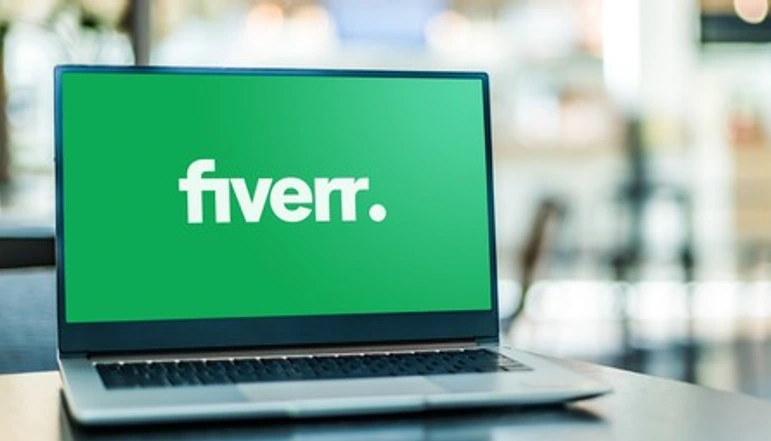If you're diving into the gig economy, particularly on platforms like Fiverr, you might be wondering about the tax implications. Do you have to pay tax on your earnings? The answer isn't straightforward, and it varies based on several factors, such as how much you earn and whether you’re considered self-employed or running a business. In this post, we’ll break it down so you know exactly where you stand when it comes to taxes on your Fiverr income in the UK.
Understanding Fiverr and Its Popularity

Fiverr has transformed the way people work, allowing freelancers to offer services ranging from graphic design to programming, writing, and marketing. Launched in 2010, it quickly gained traction for its user-friendly interface and wide variety of services. So, what makes it so popular?
Here are a few key factors:
- Accessibility: Fiverr is open to anyone with a skill to offer, making it an inclusive platform for freelancers.
- Diverse Services: Users can browse a vast array of categories, ensuring there's something for everyone. Whether you’re a voiceover artist or a digital marketer, there's a place for you.
- Global Reach: Fiverr connects freelancers with clients from around the world, broadening your potential customer base.
- Fixed Pricing: Services start at just $5, making it easy for clients to purchase without breaking the bank. This model helps freelancers price their services competitively.
- User Reviews: The platform features a review system, allowing clients to choose freelancers based on previous work and feedback.
To sum it up, Fiverr's combination of accessibility, diversity, and a global marketplace has made it a go-to platform for freelancers and entrepreneurs alike, appealing to those looking to monetize their skills. With this popularity comes the responsibility of understanding your tax obligations as a freelancer in the UK.
Also Read This: Can You Block People on Fiverr? A Comprehensive Guide
3. Tax Obligations for Freelancers in the UK

As a freelancer in the UK, understanding your tax obligations is crucial. Whether you’re working on platforms like Fiverr or directly with clients, you need to keep track of your earnings and report them appropriately. Here’s what you need to know:
Registering as Self-Employed: If you're earning money from freelancing, you must register as self-employed with HM Revenue and Customs (HMRC). This can usually be done quickly online, and you'll receive a Unique Taxpayer Reference (UTR) which is essential for your tax returns.
Keeping Records: Proper record-keeping is vital. You’ll need to maintain records of all your earnings and expenses related to your freelancing work. This includes invoices sent, receipts of business-related purchases, and any other financial documents. It’s recommended to keep these records for at least five years after the submission deadline of your tax return.
Paying National Insurance: In addition to income tax, you may need to pay Class 2 and Class 4 National Insurance contributions, depending on your profits. Class 2 is a flat fee, while Class 4 is based on your earnings. This contributes to your state pension and other benefits.
- Class 2 National Insurance: £3.15 per week (if your profits are above the Small Profits Threshold).
- Class 4 National Insurance: 9% on profits between £9,880 and £50,270, and 2% on profits over £50,270.
Ultimately, staying informed about your tax obligations not only keeps you compliant but can also help you avoid penalties and unexpected tax bills down the line.
Also Read This: How to Verify Your Fiverr Account as a US Account
4. Income Tax Explained

Income tax can be a bit of a labyrinth, especially for freelancers on platforms like Fiverr. Let’s break it down in simple terms.
In the UK, income tax is charged on your income from various sources, including your freelance earnings. Here’s how it works:
Tax Bands: The UK operates on a progressive tax system, meaning the more you earn, the higher percentage of tax you pay. Here are the income tax bands for the tax year 2023/24:
| Income Range | Tax Rate |
|---|---|
| Up to £12,570 | 0% (Personal Allowance) |
| £12,571 - £50,270 | 20% (Basic Rate) |
| £50,271 - £150,000 | 40% (Higher Rate) |
| Over £150,000 | 45% (Additional Rate) |
Calculating Your Tax: To determine how much tax you owe, you need to calculate your total income from freelancing, deduct any allowable business expenses (like software or internet costs), and then apply the appropriate tax rates to your adjusted income.
Remember, it’s essential to file your Self Assessment tax return annually before the January 31 deadline. This not only keeps you compliant but also lets you claim back any expenses incurred while running your freelance business, potentially lowering your tax bill. With proper understanding and planning, managing your income tax as a freelancer can be a smoother process!
Also Read This: How to Make a Professional Gig on Fiverr
5. National Insurance Contributions
When you earn money from Fiverr or any other freelance platform in the UK, National Insurance Contributions (NICs) come into play. NICs are essential for accessing state benefits such as the NHS and the State Pension. Essentially, the contributions you make help fund the UK's social security system.
As a self-employed individual, you must pay National Insurance if your profits exceed a certain threshold. Here are the key points to keep in mind:
- Class 2 National Insurance: If your profits are over £6,725 (for the 2023/24 tax year), you'll need to pay Class 2 NICs. This is a flat rate of £3.15 per week.
- Class 4 National Insurance: If your profits are over £12,570, you'll also have to pay Class 4 NICs, which are charged at 9% on profits between £12,570 and £50,270 and 2% on profits above that threshold.
- How to Pay: NICs are usually paid through your Self Assessment tax return, where you'll report your earnings from Fiverr and other sources.
Failure to pay NICs can result in penalties, so it’s essential to include them in your financial planning. Consider consulting a tax professional to ensure you understand your obligations and make the necessary payments on time.
Also Read This: How to Delete My Fiverr Account Permanently
6. Record Keeping for Fiverr Earnings
Good record-keeping is indispensable for managing your Fiverr business and staying compliant with UK tax regulations. Not only does it simplify the filing process, but it also helps you keep track of your income and expenses effectively.
Here’s what you need to consider when it comes to record-keeping:
- Organize Your Earnings: Maintain a clear record of all payments received through Fiverr. You can do this via spreadsheets or accounting software like QuickBooks or Xero.
- Document Expenses: Keep receipts and invoices for any business-related expenses, such as software subscriptions, marketing costs, and equipment purchases. This will help you determine your taxable profit.
- Track Payment Dates: Note the date when you received each payment. This is crucial for your accounting period and tax calculation.
- Retention Period: According to HMRC guidelines, you should keep your records for at least five years after the 31 January submission deadline, in case you're selected for an audit.
By maintaining diligent records, you’ll not only stay compliant with tax laws but also gain valuable insights into your business performance. Happy freelancing!
Also Read This: Are There Viruses on Fiverr? Understanding the Risks and Safety Measures
Tax Allowances and Deductions
When it comes to taxes, understanding tax allowances and deductions can significantly impact how much you owe at the end of the fiscal year. For freelancers using platforms like Fiverr in the UK, knowing what you can claim is crucial.
In the UK, you can take advantage of various grants that might apply to your situation:
- Personal Allowance: The first £12,570 of your earnings is tax-free (as of the payroll year 2022/2023). This means that any income you earn from Fiverr up to this amount doesn't incur any income tax.
- Trading Allowance: If you have self-employed earnings of up to £1,000, you don’t need to pay tax on this income. So, if Fiverr gigs are your primary source of income, this allowance could significantly reduce your taxable earnings.
- Business Expenses: Keep your receipts! You can claim deductions for costs related to your services. Common deductible expenses include:
- Software subscriptions (like Adobe or design tools)
- Internet costs
- Home office costs
- Professional development courses
- Marketing expenses
It’s essential to maintain organized records to validate these deductions during tax filing. Always check for updates regarding tax laws, as allowances may change. Consulting with a tax advisor can also provide personalized guidance tailored to your Fiverr income.
Also Read This: How to Pay Someone on Fiverr: A Step-by-Step Guide
Filing Your Taxes: Key Dates and Processes
Filing taxes might feel like a daunting task, especially for freelancers. However, knowing the key dates and processes can make your experience smoother. In the UK, the tax year runs from April 6th to April 5th the following year.
Here’s a timeline of important dates to keep in mind:
| Date | Event |
|---|---|
| April 6 | Start of the tax year |
| 31 October | Deadline for paper tax returns |
| 31 January | Deadline for online tax returns and any tax owed |
When you’re ready to file, here’s a straightforward process to follow:
- Register for Self Assessment: If you haven’t done so already, register with HM Revenue and Customs (HMRC) to get a Unique Taxpayer Reference (UTR).
- Gather your records: Compile all your income documents, expenses, and any other relevant financial information.
- Fill in your tax return: Use the online portal provided by HMRC to complete your Self Assessment.
- Submit by the deadline: Make sure your return is submitted on time to avoid penalties.
Tax filing is part of being a freelancer, but with a bit of preparation and organization, you'll be well on your way to staying compliant! If you have any doubts, don’t hesitate to reach out to a tax professional for advice tailored to your unique situation.
Also Read This: How to Reactivate My Fiverr Account
9. Common Tax Mistakes to Avoid
When it comes to taxes, many freelancers using platforms like Fiverr can find themselves making unintentional mistakes. These can lead to unnecessary fees or even legal trouble. Here’s a rundown of the most common mistakes, so you can avoid them and keep your earnings intact:
- Neglecting to Register as Self-Employed: Many Fiverr sellers forget that they need to register as self-employed with HMRC when they start making money. Ensure you do this as soon as your income exceeds the £1,000 threshold.
- Failing to Keep Accurate Records: Keeping detailed records of your income and expenses is crucial. Use spreadsheets or accounting software to track every sale and business-related expense. This will save you from headaches at tax time.
- Mixing Personal and Business Finances: This can lead to confusion and errors in your financial reporting. Having a separate business bank account is highly advisable.
- Overlooking Expenses: Many freelancers fail to claim all the allowable business expenses, which can reduce your taxable income. Consider expenses such as software subscriptions, internet costs, and any purchases you make specifically for your Fiverr services.
- Skipping Tax Payments: If you've been earning through Fiverr but haven’t made tax payments, this can result in penalties. Make sure to set aside money for taxes regularly and pay them on time.
- Ignoring VAT Registration: If your turnover exceeds the VAT threshold, you must register for VAT. Ignoring this can lead to significant fines.
By being aware of these common pitfalls, you can ensure you're staying on the right side of tax law while maximizing your returns from Fiverr.
10. Conclusion: Staying Compliant While Earning on Fiverr
Earning money through Fiverr can be an exciting venture, but it comes with its responsibilities, especially concerning taxes. Being compliant doesn't just help you avoid legal issues; it also lets you focus on what you love—creating and selling your services! Here are some closing tips to keep you on the right track:
- Stay Informed: Tax laws can change, so make it a point to stay updated on any alterations in UK tax policy that could impact your earnings.
- Use Professional Resources: Consider consulting with a tax advisor or accountant who understands freelance income and can guide you through any complexities.
- Utilize Digital Tools: There are many apps and software solutions available that can simplify tracking income, expenditures, and tax obligations, making your life much easier.
- Plan for Tax Payments: Set aside a portion of your earnings monthly to ensure you have enough to cover your tax bill when it's due.
- Review Regularly: Regularly review your financial status and tax situation to make sure you're on track. This helps you adjust any plans if necessary.
By following these guidelines and avoiding common mistakes, you can enjoy your freelance journey on Fiverr while confidently managing your tax obligations. Remember, staying compliant doesn’t have to be a burden—it can be a natural part of your business growth!



